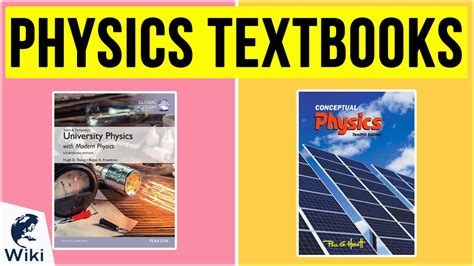Physics is a fundamental science that delves into the workings of the universe, from the smallest particles to the grandest galaxies. Understanding physics requires a solid foundation in its principles and concepts, and textbooks play a crucial role in providing this foundation. This guide presents a comprehensive selection of the best physics textbooks available for students of all levels.

Introductory Physics Textbooks for High School and Undergraduates
1. Physics for Scientists and Engineers by Raymond A. Serway and Jewett
This textbook is a highly acclaimed choice for introductory physics courses in high school and undergraduate programs. It covers a comprehensive range of topics, including mechanics, thermodynamics, electromagnetism, and waves. The text features clear explanations, numerous examples, and hundreds of practice problems to reinforce understanding.
2. College Physics by Serway and Jewett
A modified version of “Physics for Scientists and Engineers,” this textbook is specifically designed for introductory college physics courses. It includes additional chapters on modern physics, such as special relativity and quantum mechanics. The text emphasizes conceptual understanding and problem-solving skills.
3. Fundamentals of Physics by Halliday, Resnick, and Walker
This long-standing textbook has been a staple of introductory physics courses for decades. It provides a thorough grounding in the fundamental concepts of physics, with a strong emphasis on mathematics. The text offers extensive coverage of problem-solving and includes hundreds of practice problems.
Intermediate Physics Textbooks for Undergraduates
1. University Physics by Young and Freedman
This textbook is widely used in undergraduate physics courses, particularly for students majoring in the physical sciences or engineering. It presents a comprehensive overview of physics, including mechanics, thermodynamics, optics, and modern physics. The text is known for its clear explanations, numerous solved examples, and challenging problems.
2. Physics for Scientists and Engineers with Modern Physics by Giancoli
This textbook provides a comprehensive coverage of physics for undergraduate students in the sciences and engineering. It includes chapters on modern physics topics, such as quantum mechanics, nuclear physics, and particle physics. The text features a modern and engaging writing style, with a focus on conceptual understanding and real-world applications.
3. Physics by Cutnell and Johnson
This textbook is designed for undergraduate physics courses that emphasize conceptual understanding and problem-solving skills. It features a clear and informal writing style, with many examples and applications drawn from everyday life. The text includes extensive end-of-chapter problems and practice exams.
Advanced Physics Textbooks for Graduates and Researchers
1. Classical Mechanics by Goldstein, Poole, and Safko
This textbook is a classic in the field of classical mechanics. It provides a comprehensive and rigorous treatment of the subject, including topics such as Lagrangian and Hamiltonian mechanics, chaos theory, and special relativity. The text is highly regarded for its clarity and depth of coverage.
2. Quantum Mechanics by Griffiths
This textbook is widely used in graduate physics courses on quantum mechanics. It provides a clear and accessible introduction to the fundamental concepts of quantum mechanics, including wave-particle duality, Schrödinger’s equation, and quantum entanglement. The text emphasizes conceptual understanding and includes numerous worked examples and exercises.
3. Statistical Mechanics by Kubo, Toda, and Hashitsume
This textbook is a comprehensive treatment of statistical mechanics, covering topics such as thermodynamics, kinetic theory, and quantum statistical mechanics. It is known for its rigorous approach and extensive coverage of advanced topics. The text is highly regarded by researchers and graduate students in physics, chemistry, and other related fields.
Comparison of Popular Physics Textbooks
The following table provides a comparison of the key features of the aforementioned textbooks:
| Textbook | Level | Coverage | Emphasis | Features |
|---|---|---|---|---|
| Physics for Scientists and Engineers | Introductory | Mechanics, Thermodynamics, Electromagnetism | Problem-solving, Conceptual understanding | Numerous examples, practice problems |
| College Physics | Introductory | Mechanics, Thermodynamics, Electromagnetism | Conceptual understanding | Additional chapters on modern physics |
| Fundamentals of Physics | Introductory | Fundamental concepts | Mathematics | Extensive coverage of problem-solving |
| University Physics | Intermediate | Comprehensive overview | Conceptual understanding, Problem-solving | Clear explanations, solved examples |
| Physics for Scientists and Engineers with Modern Physics | Intermediate | Comprehensive coverage | Modern physics | Modern writing style, real-world applications |
| Physics | Intermediate | Conceptual understanding, Problem-solving | Informal writing style | Extensive end-of-chapter problems |
| Classical Mechanics | Advanced | Comprehensive, rigorous treatment | Lagrangian and Hamiltonian mechanics | Clarity, depth of coverage |
| Quantum Mechanics | Advanced | Fundamental concepts | Conceptual understanding, worked examples | Accessible introduction, numerous exercises |
| Statistical Mechanics | Advanced | Thermodynamics, kinetic theory | Rigorous approach, advanced topics | Comprehensive coverage, highly regarded |
How to Choose the Right Physics Textbook
Choosing the right physics textbook depends on several factors, including:
- Level: Consider the level of the course and your prior knowledge in physics.
- Coverage: Ensure the textbook covers the topics relevant to your course.
- Emphasis: Choose a textbook that aligns with the instructor’s teaching style and your learning preferences.
- Features: Look for textbooks with clear explanations, worked examples, practice problems, and other features that enhance understanding.
- Reviews: Read reviews from other students and instructors to get a better idea of the textbook’s quality and effectiveness.
Conclusion
Physics textbooks are essential resources for students and researchers alike. This guide has presented a comprehensive selection of the best physics textbooks available for different levels of study. By using the information provided in this article, you can make an informed decision and choose the textbook that best suits your specific needs.
